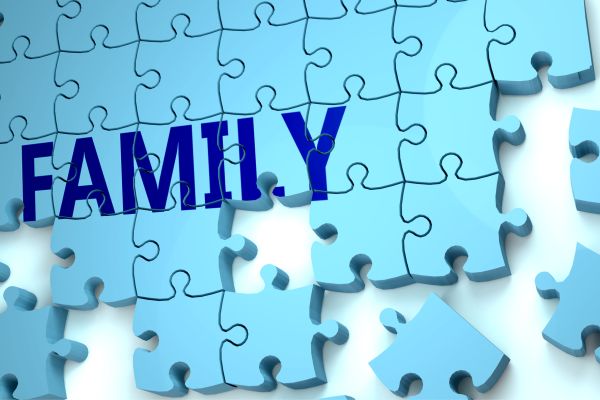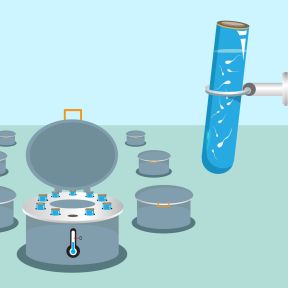The Process of Adoption
Adoption can be exhilarating, scary, confusing, and hopeful, all at the same time. Adoption, though a fairly common means of forming a family, is rarely represented in media; as a result, prospective parents are often unfamiliar with the overall process and timeline. They may also be blindsided by the confusing emotions they experience, as well as by the sometimes disheartening responses from family and friends. Learning about the complex, often-slow road to a successful adoption—and educating oneself about a child's arrival—can help parents feel in control and develop the stamina to navigate the process and create a family.
On This Page
Making the decision to adopt a child is easy for some; indeed, there are many people who report that they’ve wanted to form a family via adoption for as long as they can remember. For others, however, the decision is more complicated. Many pursue adoption after trying unsuccessfully to have a biological child; in these cases, they may worry that adoption is “second best” or face confusing feelings of grief or shame. Others may feel excited to adopt but find the process to be slow, costly, or confusing. Prospective adopters often find that keeping their expectations realistic, educating themselves about adoption as much as possible, and seeking support from those who have been there are the best tools for navigating the long road to their future family.
Adoption can be slow. The process typically lasts anywhere from several months to several years, depending on which route the prospective parents pursue. Domestically, adopting an infant typically takes significantly longer than adopting an older child or adopting from foster care. Internationally, the wait varies by country but typically takes at least a year; for countries that have tight restrictions and/or a long waiting list, it may last five years or more. Adopting a child without special needs takes longer than adopting one with special needs, both domestically and internationally. Talking to a reputable adoption agency can help prospective adopters get a sense of how long they can expect to wait before being matched.
Adoption is often a fulfilling journey for soon-to-be parents, but it’s not without its challenges. Most adoption experts advise prospective parents to prepare themselves for a long wait; if it goes quicker than they thought, they may find themselves pleasantly surprised. They should also be ready for false starts—a birth mother who seems to like them, for instance, but ends up choosing someone else. Recognizing ahead of time that there may be bumps in the road can build parents’ resilience; many parents also report that weathering a few challenges ultimately made their journey to meet their future child feel even more rewarding.
Absolutely. Many people who experience infertility before deciding to adopt have spent the preceding years navigating taxing fertility treatments, miscarriages, and/or the frustration of failing to get pregnant. Once that period of uncertainty ends, they may be surprised to find themselves grieving or worry that it means that adoption is the wrong choice.
But individuals or couples who spent months or years trying to conceive often had a vision in their head of what their future family would look like; deciding to adopt means grieving for that “lost” family. Many struggling with infertility—especially women—feel guilty, like they’ve “failed,” or that choosing adoption is “giving up”; it will take time to navigate these complex feelings, but they don’t necessarily indicate that adoption is the wrong choice. Rather, they’re a normal part of embarking on a new stage of life.
Prospective parents should be honest and direct when explaining why adoption is the right choice for them. It can help to come armed with books, pamphlets, or other information that outlines what the process will look like and what family members can expect. Parents should remember that adoption is widely misunderstood; when telling their family, they should prepare to answer basic questions or refute widely-held myths (like that the birth parents can reclaim the child at any time, or that open adoption confuses children). They should allow space for their family members to come to terms with the decision. Some may be upset at first; many adoptive parents report that with time (or upon meeting their adopted child), once-reluctant family members come around to the idea of adoption.
Parents should explain adoption in positive and age-appropriate ways; for younger children, there are several books that outline the process in words children can understand. Younger children may also benefit from “playing” adoption, as children process thoughts and feelings best through play. Parents should be realistic—explaining that it might take a long time, for instance—and emphasize that adoption is a common way to form a family. It can also be helpful to involve the child in the process—asking her to help pick out toys for her new brother, for instance. During the wait, parents should also prioritize spending time with their child and showing plenty of affection; for younger children specifically, this can help them cope with feelings of jealousy and make sure they know that they’re not being “replaced.”
It is possible, and single parents make up a significant percentage of adoptive parents. Single parents can adopt domestically, internationally, or from foster care. The latter option may be preferable for many prospective single parents—in 2017, the Children’s Bureau reported that nearly 20,000 single parents successfully adopted from foster care, and state welfare agencies usually welcome single parents to adopt from foster care because there are many foster children in need of a home.
On the other hand, there may be some hurdles for single parents hoping to adopt a newborn domestically or adopt a child of any age internationally—some U.S. birth mothers, for instance, may prefer to place their child in a two-parent home, while some countries do not allow single parents to adopt or place additional restrictions on them. However, these hurdles are not usually insurmountable. For singles who are interested in adopting a newborn or adopting internationally, working with a reputable adoption agency can help them identify the options that are most likely to be successful.
Single adoptive parents, like single parents in general, may face stigma from those who consider single-parent homes to be harmful to children. Preparing responses to insensitive comments ahead of time can help, as can building a support system of friends, family, and other community members who can commiserate when rude comments are made.
A support system will also be critical for helping single parents navigate the long adoption wait—challenging for all prospective parents—and for providing concrete assistance once the child arrives. Most parents, single or not, work full-time—but without a partner to share the parenting load, singles may find juggling work and parenting to be especially challenging. Knowing that a friend or family member can step in when needed to help with childcare can significantly reduce stress and anxiety for single parents and can allow them time for self-care.
Yes, LGBT individuals and couples are able to adopt, and many go on to form loving families through adoption. Because of lingering stigma against LGBT couples and singles of any sexuality, however, there may be barriers to adoption by openly gay or transgender individuals that don’t always exist for straight, married couples.
In general, LGBT couples will find it easier to adopt domestically; some countries, particularly those that are more religious or socially conservative, do not allow LGBT couples to adopt. Domestically, LGBT couples have a legal right to adopt children in all 50 states. However, some states continue to allow private and/or faith-based adoption agencies to turn away prospective parents based on their sexual orientation or marital status. Gay couples or LGBT individuals adopting in these states may need to do additional research to locate an agency that is accepting of their orientation.
Like the decision to adopt, deciding not to adopt is a personal one. Many people are not comfortable with the idea of adopting, for various reasons: the cost, the daunting process, or simply because it’s not the way they envisioned forming their family. All of these reasons are perfectly valid.
Unfortunately, it is possible that some people will judge someone who does not want to adopt, especially if the person expresses interest in having children. This is likely due to cultural narratives suggesting that people who don’t want to adopt are “selfish” or that pursuing a biological family when there are many children in need of homes is immoral.
But adoption is a challenging, complex process, and no one should be made to feel guilty if it’s not something they wish to pursue. Those who are uninterested in adopting should not hesitate to state their boundaries clearly to others who express judgment; while it may not be possible to change their mind, someone who wishes not to adopt is under no obligation to listen to criticism surrounding their decision.
Claims that being raised by LGBT parents is harmful to children have been repeatedly shown to be false. However, lingering stigma and cultural stereotypes do mean that many LGBT parents—particularly those that live in more socially conservative locations—will have to push back against prejudice or claims that they are not as suited to parenthood as a straight couple would be.
In some cases, this stigma will also affect their children, who may be teased or questioned about their parents’ orientation or gender identity. Adoptive parents should make an effort to speak openly with their child about homophobia, transphobia, and other forms of prejudice and prepare them to respond to negative comments if necessary. On the flip side, it’s also important to assure the child that families can be made in many different ways and encourage her to take pride in her adoption story and how her family was formed.
Much of the adoption process involves waiting: waiting for a home study to be completed, waiting to meet and be interviewed by expectant birth mothers; waiting to meet their child, if he or she is older; and/or waiting until the child is ready to come home. Unlike the wait for a biological child, it may feel as if there is no clear end in sight—particularly if the parent or family experiences false starts, agency roadblocks, or other time-consuming setbacks. Navigating the long wait without sinking into despair or apathy is a common challenge for adoptive parents; seeking support from others who are also waiting is a common and effective way to stay positive and remain focused on what needs to get done in order for a child to arrive home.
The adoption process is all about endurance. When first starting out, prospective parents should remind themselves—and friends and family, if necessary—that it may take a very long time. Beyond practicing patience, adoptive parents often find that it helps if they dedicate the time to education and preparation. This could mean learning about adoption, parenting, and trauma or setting up a space in their home for their new child. It may also mean figuring out what they will do for schooling, whether their employer offers adoption leave, where they will seek medical care for their child, and other basic necessities. Since much of the adoption process is out of parents’ control, focusing on areas in which control is possible can help reduce stress and increase feelings of security.
In some ways, preparing for biological parenthood and preparing for adoptive parenthood are similar. The parent(s) will usually “nest” (get their home ready for the new arrival), make a plan for taking leave, and/or educate themselves about what the first days and months with their child will be like. Adoptive parents may need to dig deeper into self-education—learning about their child’s birth culture, how they can best promote attachment, how they can manage special needs (if applicable), and how they can talk about adoption in an open, honest way once their child arrives. All parents—both biological and adoptive—should make sure to practice self-care; preparing for parenthood is stressful and time-consuming, and parents should work to reduce anxiety, prioritize their own health and well-being, and be patient with themselves.
Adoptive parents should remind themselves that almost every parent, including biological ones, worries that they won’t be good at it. It can help for adopters to seek guidance from other adoptive parents about what they did to manage worries or how they got their footing once their child arrived; talking to one’s own parents, too, can be an outlet for anxieties and a way to recognize that few parents feel competent immediately. Spending time around other children—whether nieces or nephews, friends’ children, or children in the community—can help soon-to-be parents get “practice” and may help soothe fears that they’re bad with kids.
Not being chosen by an expectant mother can trigger feelings of rejection, insecurity, and despair. Prospective parents should recognize that in most cases, they did nothing wrong. The birth mother may have simply found someone else who was a better fit; conversely, she may have decided to parent the baby herself. It’s important for the prospective parent or parents to allow themselves to feel grief or disappointment. Talking with friends, family, a partner, or a therapist can help.
Parents should explain from the beginning that adoption will likely take a long time; when children ask how much longer it will take, it’s best to answer honestly—even if that means saying, “I'm not really sure when your new brother or sister will arrive.” Make sure to engage in plenty of activities as a family; this can both distract a child from focusing on their soon-to-be sibling and ensure that they feel loved and supported during the wait. Parents should provide children with the space to express excitement, impatience, curiosity, or disappointment.
Finding an online support group (or an in-person group, if one is available) can be immensely helpful. Adoption is a rollercoaster, and is often best understood by those going through the process or those who have already navigated it. Talking to a therapist, too, can be a great help.
Prospective parents often feel caught off-guard when a loved one or a stranger makes a rude or inaccurate comment about adoption. Preparing responses to some of the most common negative comments—like, “How can you love a child that isn’t yours?” or “Aren’t you afraid that his real mother will take him back?”—ahead of time can help adoptive parents feel in control when the situation arises. It can also help for parents to remind themselves that in many cases, negative comments are not coming from a place of malice; they may stem, instead, from a lack of understanding about adoption or lingering stigma. Some parents feel better when they decide to educate, rather than criticize, those who say hurtful things.














